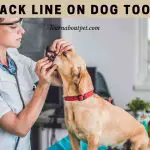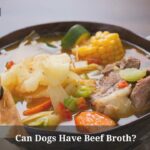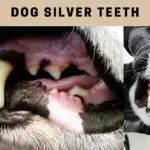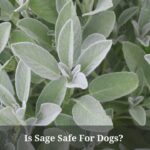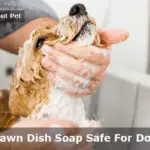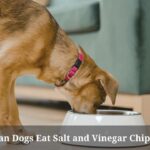Almost all major pet food stores nowadays stock Yak chews for dogs. But are the Yak chews actually safe for dogs? We set out to find out.
Are Yak chews safe for dogs? Yes, Yak chews are safe for dogs, because they are based on natural ingredients, with absolutely no preservatives, artificial flavoring or other obnoxious chemicals.
Of course just like all other dog chews, if a dog happens to chew too hard on a Yak treat, it can potentially incur tooth damage.
But that is something we very rarely hear of, with regard to Yak chews.
On another note, a dog chewing on Yak chews could possibly swallow pieces that are too big, causing obstructions internally.
Or a dog that happens to be chewing on Yak chews could potentially choke on them…
Such mishaps – like swallowing pieces of Yak chews that are too big or choking on the Yak chews – are rather rare.
For the most part, Yak treats are regarded as some of the truly safer dog chews.
Now right from the outset, we do need to note that the treats in question are also referred to as Himalayan Yak chews.
That is because they are primarily made using milk from an animal known as the Himalayan Yak.
You may thus hear people also referring to them as Himalayan Yak cheese chews for dogs.
And when you set out shopping for dog chews in most stores these days, there (Yak chews) are likely to be among the ones that you keep encountering.
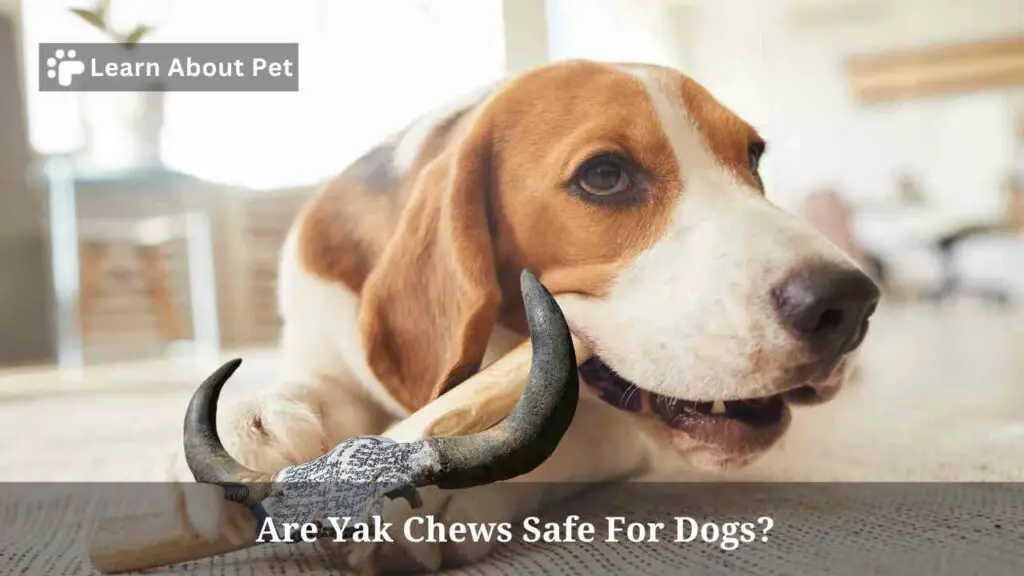
What Are Yak Chews?
Yak chews can be described as chew treats for dogs that are made from Himalayan Yak milk (alongside a few other ingredients).
Yaks are cattle-like animals kept in the Himalayas and Tibet.
The chews are actually made in the Himalayan region, by a company known as Himalayan Pet Supply.
So their name is due to the fact that they are primarily made using Himalayan Yak milk.
The Yak chews have been available in the US market for more than a decade now.
What Are Yak Chews Made Of?
As their name suggests, the primary ingredient in Yak chews is milk obtained from the animal known as Himalayan Yak.
That is indeed why we sometimes simply refer to them as Yak milk chews for dogs.
Besides the Yak milk base, the chews also have cow milk in them.
Other ingredients that are present in these chews in very small quantities are lime juice and some salt.
Are Yak Chews Safe For Dogs?
Yak chews are considered to be very safe for dogs.
For one, the Yak chews are made from all-natural ingredients. Therefore any safety concerns that are ingredient-related are allayed.
Granted, one of the ingredients in Yak chews is salt. Thus one may be entitled to ask, are Yak cheese chews really safe for dogs given that they contain salt?
But the truth of the matter is that the amount of salt in Yak chews is very small. It can’t possibly cause a dog any real harm.
On another note, Yak treats are designed in a manner that makes them safe for dogs to chew on.
You hardly ever hear of any Himalayan dog chew broken teeth complaints (especially if the Himalayan dog chews in question are Yak treats).
Even rarer are incidents of dogs ever being said to have choked on the Yak chews.
Compared to most other chews in the market, Yak chews come near the top in terms of safety.
Do Vets Approve Of Yak Chews?
To further find out whether or not Yak chews are safe, we need to know whether vets approve of them.
So, indeed, do vets approve of Yak chews?
The answer is ‘yes’ – as we often find vets recommending these particular treats for things like removal of plaque and tartar from dogs’ teeth.
So these are definitely among the vet-recommended dog chews.
And based on the fact that vets often recommend them, we get further reassurance on the safety of the Yak chews.
Are Yak Chews Safe For Dogs Teeth?
The biggest concern for people who happen to be considering buying Yak chews is on whether or not they are really safe for dogs teeth.
People naturally want dog chews that won’t break teeth!
Against that background, you have folks asking, are Yak chews too hard for dogs? Or, to put it more poignantly, can dogs chip teeth on Yak chews?
The truth of the matter is that Yak chews are quite tough, in terms of texture. That is just as well, because otherwise they would be of no use as dog chews.
However, the toughness of Yak chews is not to the extent where they would be capable of causing dogs’ teeth to break in most cases.
So they are tough – but not so tough as to be capable of damaging normal dogs’ teeth.
The only exception would be where a dog happens to chew too hard on the Yaks. Then the risk of teeth damage would certainly arise.
Another scenario would be where very young puppies (ones still with deciduous teeth) are given the Yak chews. In this case too, there can possibly be some damage to the teeth.
Generally though, for dogs with normal teeth, Yak chews tend to be safe.
Are Yak Chews Safe For Dogs To Eat?
To find out whether Yak chews are safe for dogs to eat, we need to make reference to the ingredients in them.
As we saw earlier, the main ingredient in these chews is Yak milk. Other additional ingredients are cow milk, salt and lime juice.
Now the Yak milk that is the main ingredient in these chews is very low in lactose. As such, it is largely safe for dogs.
There may be some cow milk in Yak milk, as well as salt, but not in amounts that would usually harm a dog.
So based on all those facts, the conclusion is that Yak chews are safe for dogs to eat.
We indeed have many people who have given their dogs Yak chews to eat over the years, with no negative experiences.
Thus the Yak chews are safe for dogs.
Are Yak Cheese Chews Safe For Puppies?
Quite often, the person enquiring on the safety of Yak chews turns out to be the owner of a puppy, rather than a mature dog.
Therefore they seek to know, can puppies have Yak chews?
The answer is that very young puppies, whose teeth development is incomplete, shouldn’t have Yak chews.
That is because the Yak chews may prove to be too tough for such underdeveloped teeth. This may lead to teeth damage when the puppies try to chew on the Yak treats.
However, once the puppy gets to a stage where it sheds the deciduous teeth and develops permanent teeth, it can start having Yak chews.
One may then ask, from what age can puppies have Yak chews?
And that would vary from dog breed to another: though most will have shed their deciduous teeth by the time they are 9 months old at the latest.
Are Yak Chews Good For Your Dog?
Besides being safe for dogs, Yak chews are also beneficial.
One benefit dogs tap from chewing on Yak treats is that of plaque and tartar removal (from the teeth).
The removal of plaque and tartar from the dogs’ teeth, as a result of chewing on Yak treats, in turn leads to better breath.
Chewing on the Yak treats also gives the dogs great pleasure. It can help in making them less bored and less anxious.
On another note, the nutrients in the Yak milk which the treats are made out of are also worth having for the dog.
So Yak chews are definitely good for your dog.
How Often Can Dogs Have Yak Chews?
Having learnt that Yak chews are both safe and good for dogs, it then becomes necessary to know how often dogs should be given a chance to enjoy these treats.
So, indeed, how often can dogs have Himalayan Yak chews? For instance, can my dog have a Yak chew everyday?
The answer is that Yak chews are (thankfully) the sorts of chews which dogs can have even on a daily basis.
At the very least, you need to expose your dog to one or another type of chew treat once or twice a week, for dental plaque and tartar removal purposes.
How Long Should Dogs Chew On Yak Treats?
Another pertinent question on the use of Yak chews for dogs is on how long dogs should be allowed to enjoy them per session.
So, indeed, how long should I let my dog chew a Himalayan Yak chew? The answer is that you should ideally let a dog enjoy the Yak chew for 10 to 20 minutes per day.
That should be enough to give the dog adequate enjoyment, while also removing plaque and tartar from its teeth.
What Are The Alternatives To Yak Chews For Dogs?
Some people may find Yak chews too expensive. Or they may have other concerns about the Yak chews – causing them to want to know about the viable alternatives that are available.
Now one reasonable alternative to Yak chews for dogs is that of using raw bones.
Frozen carrots can also work just as well. We also have sweet potato chews and antlers as some of the decent alternatives.
On another note, there are those who may mention bully sticks as suitable alternatives to Yak chews.
Indeed, one of the most commonly asked questions in this context is, are Yak chews better than bully sticks?
The answer is that both Yak chews and bully sticks have their pros and cons. But the Yak chews do have the advantage of being odor free, besides also being somewhat more nutritious.
Final verdict
Yak chews are safe for dogs.
The ingredients that Yak chews are made from – mainly Himalayan Yak milk, alongside little amounts of cow milk, salt and lime juice – are safe for dogs.
Furthermore, the manner in which the Yak chews are designed is such that most dogs are able to chew on them safely.
Of course, if an individual dog happens to chew too hard on the Yak treats, its teeth may get damaged.
Then there is the rather remote possibility of the dogs swallowing too excessively large bits of Yak chews.
Alongside that is the possibility of the dogs choking on the Yak chews.
But rarely do we ever hear of dogs having gotten gastrointestinal obstructions, teeth damage or choking on account of Yak chews usage.
So, for the most part, we can assert that Yak chews are safe for dogs.

Welcome to Learn About Pet. My name is Rajkumar Ravichandran and I love all pets, travel, and amazing food. I write about my passion and personal experience caring for multiple pets in this blog! ❤️
Post Disclaimer
DISCLAIMER: THIS BLOG OR WEBSITE, "Learn About Pet", DOES NOT PROVIDE YOU WITH MEDICAL ADVICE AND IS NOT A SUBSTITUTE FOR MEDICAL ADVICE. ALWAYS GET IN TOUCH WITH YOUR PERSONAL VETERINARIAN AND USE INFORMATION HERE AS GENERAL ADVICE.
The information, including but not limited to, text, graphics, images and other material contained on this website are for informational purposes only. No material on this site is intended to be a substitute for professional veterinary advice, food recommendation, diagnosis, or treatment. Always seek the advice of your veterinarian or other qualified health care provider with any questions you may have regarding a medical condition or for pet food related questions.
